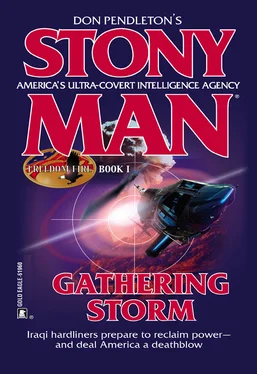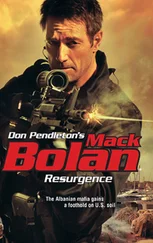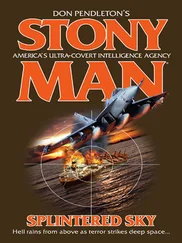He froze, staring at the image the camera gave him. his finger hovered over the button as his disbelieving mind held him in immobility. He might have stayed that way if his professionalism hadn’t clicked in. His finger came down on the button and the camera took a succession of shots. It was only as the sound of the shuttering mechanism intruded that Keen snapped back to reality. He took his finger off the button and sat back, still taking in what he had seen.
To be precise, who he had seen—a man who had been pronounced and identified as dead during the war. The man had been killed during a running battle with an American Special Forces team in the northern Iraqi town of Tikrit. He had been found in the ruins of an official party headquarters, his body having taken the full force of a grenade. In a local hospital, a doctor had examined the body and carried out an autopsy. When his report had been delivered, it had identified the dead man.
Razan Khariza.
A colonel in Hussein’s military, Khariza had been hated and despised for his treatment of Iraqi citizens. He had a penchant for torture. For devising and utilizing terrible means for extracting information, or for simply inflicting pain on those who stood up against the former regime. Khariza was a man who had little respect for his own people. He had willingly participated in purges within the administration, turning against people he had previously called friends. In his other capacity he had undertaken the purchase and importation of weapons and technology aimed at improving Iraq’s offensive ordnance. Khariza had traveled extensively on behalf of the regime, making and fostering contacts in a number of countries and with individuals able to arrange the purchase of weapons and equipment.
He had supposedly been killed during the hostilities.
But here he was, alive and well, heading a meeting with the very men he had commanded during the time he had served the former dictator of Iraq.
Now, with the image still large in his viewfinder, Keen realized he had stumbled on to something big. He had no doubt he was looking at Khariza. He knew the man’s face well. This was no lookalike. Razan Khariza had never used a double. There had been no need. He’d never had high a profile. His work was done in the shadows, out of the light of day. And if he was dead, what would be the purpose of someone impersonating him? There would be no logic to that. A double might have the appearance but wouldn’t carry what was in Khariza’s head. Keen was convinced he was looking at the genuine article, and the more he studied the man, the more he started to understand the recent activity among the group Khariza was talking with right now.
There had been a great deal of coming and going from the villa over the past few days. Keen had been curious as to why. Now he understood. The group had been preparing for Razan Khariza’s appearance. Now he was here, in the flesh, and Abe Keen knew something was being organized.
He used up the rest of his roll taking as many shots as he could, then put his camera away. He slung his bag over his shoulder and backed away from his vantage point. He moved carefully, staying in cover until he was well clear, then gained his feet and negotiated the slope that would take him back to where he had parked his rental on the road that wound up into the hills from the main highway. It provided access to the villas scattered around the hills and cars were always driving back and forth through the area.
He unlocked the Peugeot’s door and slipped in behind the wheel. He started the car and turned it around, driving back to the main road and heading for San Remo. His mind was full of questions he didn’t have answers to. Keen was trying to work out what Khariza was up to. He hadn’t shown himself simply to have a get-together party with his old friends from the regime. The five men seated at that table were hard-line loyalists of the former regime. Keen had no illusions. The five were planning something.
He just wished he knew what.
KEEN’S CAR HAD GONE, leaving only a faint mist of dust in the warm air. A man eased out of the undergrowth, pausing to brush a hand over his clothing. He carried an expensive digital camera in his free hand. He made sure it was secure before he slipped it into a pocket inside his suede jacket. The action pushed aside the jacket to briefly expose the Glock autopistol carried in a shoulder holster.
He made his way down the side road, having to step to the side as cars appeared and drove by. He returned to where his partner was waiting in a car some distance along the road that wound its way in the direction of the villa. He took out a transceiver. He activated it and raised it to his lips, speaking to the person who responded to his call.
“Yes. There was someone watching. We think he was taking photographs of the villa. It was too risky to do anything here. Too many cars up and down the road. But I know what car he is driving. We can trace him through that. And I took photographs of him. We can run it through our database. Once we identify him, something can be done. Don’t concern yourself over that. It will be taken care of.”
KEEN DROVE DIRECTLY to his hotel, parked the car and went to his room. The first thing he did was to rewind the film in his camera and remove it. He took out a new roll of film and put it in his camera, pressing the release button to expose about half the film. He placed the camera in its case, then he sat on the edge of the bed, studying the roll of film in his hand, debating his next move.
Ten minutes later Keen left the hotel and drove across town to a photo store. He knew the man who ran it. After a few moments discussing the price, Keen was installed in the darkroom at the rear of the store. An hour later he was done. He had processed and printed the images captured on the film. With the results in a manila envelope, he returned to where he had parked his car and drove back to the hotel.
He spread the photos out across the bed and studied them. He had printed off two sets. He slipped the negatives and one set of prints into a padded envelope and wrote his own London address on the front. Calling the desk, he asked for a seat to be booked on the next available flight to London. The desk returned his call ten minutes later and confirmed they had him booked on a flight that left at eight-thirty that evening.
Keen took a laptop from its case, placed it on the writing desk and connected it to one of the room’s power points. From his equipment case he took a slim scanner and plugged it into the laptop. He disconnected the room phone from the socket and plugged in a modem cable from the laptop. He spent the next ten minutes scanning a number of the photographs, assigning them to document files before accessing his e-mail address book. He scanned the list of names until he found the one he wanted and opened a new e-mail. He typed in a brief message, attached the document files and sent the message. The files took time being transmitted, but Keen was eventually rewarded with the acknowledgment that his e-mail and attachments had been successfully delivered.
Working steadily, he disconnected his equipment and stored it all away in the carry bag, including the set of prints he had scanned. He reconnected the room phone, then glanced at his watch. Still plenty of time before his flight. Keen checked the room, making sure he had packed everything. Then he called the desk again and asked for his room bill. He picked up his luggage and left the room, making his way down to the lobby. At the desk he settled his bill, paying for his flight at the same time. His ticket would be waiting for him at the check-in at the airport.
His luggage was placed in the trunk of the Peugeot. Keen climbed in and drove away. He had things to do before he headed for the airport.
Читать дальше












